With over 75 million US adults suffering from digestive issues, the phrase "listen to your gut" has transcended being a mere metaphor to become a vital health mantra! Far from being a fleeting health fad, gut health emerges as a cornerstone of overall wellness, playing a pivotal role not just in digestion but also in the operation of virtually every organ system in the body. While pinpointing an unhealthy gut isn't straightforward, certain indicators can serve as red flags. This article discusses the 10 commonly observed signs of an unhealthy gut and some of the most effective lifestyle changes to fix your gut.
About Xcode Life
Calling the gut the body’s second brain would still be an understatement, considering the important roles it plays in our bodies.
By digesting the food consumed and absorbing the essential nutrients from it, the gut fuels and maintains the entire body.
Therefore, it is no surprise that the importance of the gut in maintaining overall health is increasingly becoming an important research topic in the medical community.
| Heart Health | TMAO is a substance made in our gut when we digest certain foods. High TMAO levels in our blood, influenced by our diet and gut bacteria, are linked to heart disease in humans. If we feed our bodies with certain kinds of food, it encourages the gut bacteria to produce more TMAP, thereby endangering our heart health. |
| Kidney Health | Uremic dysbiosis is a pathogenic condition that affects the ability of the kidney to filter properly due to an imbalance in the gut microbiome. Uremic dysbiosis can also be caused by excess plasma TMAO and lead to chronic kidney disease. Medical experts believe treating an unhealthy gut can help prevent uremic dysbiosis or reduce its severity. |
| Immune System | Did you know that 70-80% of immune cells are present in the gut? Therefore, the gut plays a direct role in influencing the immune system, which is why certain types of gut microbiota have been linked to autoimmune diseases. |
| Liver health | Studies report that a leaky gut may cause the movement of gut microbiota to the liver, resulting in the development of liver diseases. The composition of gut microbes can also influence bile metabolism. Issues with bile metabolism lead to liver disorders. |
| Skin Health | Gut health directly affects skin inflammation and influences acne breakouts. The gut also helps in the absorption of essential nutrients like vitamins A, E, and C and fatty acids, all of which are important in maintaining skin health. |
| Mental Health | The gut produces essential neurotransmitters like serotonin and dopamine, which affect mood, regulate sleep, and influence mental health. An unhealthy gut may lead to neurotransmitter imbalances, leading to various mental health issues. |
| Body Weight | The gut produces hormones that control feelings of hunger and satiety. An unhealthy gut may lead to problems in regulating these hormones, causing overeating issues. The gut also determines how nutrients are absorbed, and fat is stored, which also affects body weight. |
Here are ten notable signs of an unhealthy gut.
One of the common signs of an unhealthy gut is food sensitivities. The low quality of gut microbes may make it difficult to digest certain types of food, leading to post-meal problems like bloating, abdominal pain, diarrhea, and nausea.
Migraines cause intense headaches and sensitivities to sound and light. Gut microbe imbalance may play a role in the development of migraines.
Acne is a skin inflammatory condition that causes skin breakouts.
Gut issues could be one reason for recurring acne breakouts.
A 2019 study reports that skin acne is closely connected with the gastrointestinal tract and that the gut microbiota may be involved in the development and severity of acne.
The gut plays a role in regulating the circadian rhythm in the body.
The circadian rhythm is the 24-hour internal clock that tells the body when to sleep and when to stay awake.
Sleep disorders like insomnia, difficulty falling asleep, or excessive daytime sleepiness may all be signs of an unhealthy gut.
Another telltale sign of an unhealthy gut is Gastroesophageal reflux disease (GERD) and frequent heartburn.
Gut dysbiosis is a condition caused by an imbalance in the gut microbes.
A 2019 study reports that gut dysbiosis is a common cause of conditions like GERD, irritable bowel syndrome, and colitis.
Bloating is an excess buildup of gas in the GI tract which can make the belly feel tight, full, and uncomfortable, especially after a meal.
It is mostly a result of digestive issues and hormonal imbalance, both of which are signs of an unhealthy gut.
Gut dysbiosis can be another cause of frequent or chronic constipation.
Studies suggest targeting gut dysbiosis using probiotics, prebiotics, synbiotics, and fecal microbiota transplantation (FMT) to treat constipation.
Inflammation is the body’s way of handling an injury, infection, or sickness and is regulated by the immune system.
The presence of certain types of gut bacteria can trigger the immune system to cause chronic inflammation in all parts of the body.
Chronic inflammation leads to increased risks of type II diabetes, cardiovascular problems, and even certain types of cancers.
The inability to maintain a healthy body weight could be a sign of an unhealthy gut.
The gut microbiomes are responsible for energy expenditure and the absorption of nutrients from food.
The gut microbes also affect the production of ghrelin, leptin, and peptide YY hormones, all of which affect your appetite.
An unhealthy gut may lead to lower energy expenditure and nutrient absorption and keep you feeling hungry, leading to weight gain issues.
The gut and the brain are very closely connected and can affect one another. The gut is called the second brain for this reason.
Psychological problems can lead to GI issues, while an unhealthy gut can be the root cause of conditions like stress, anxiety, or depression.
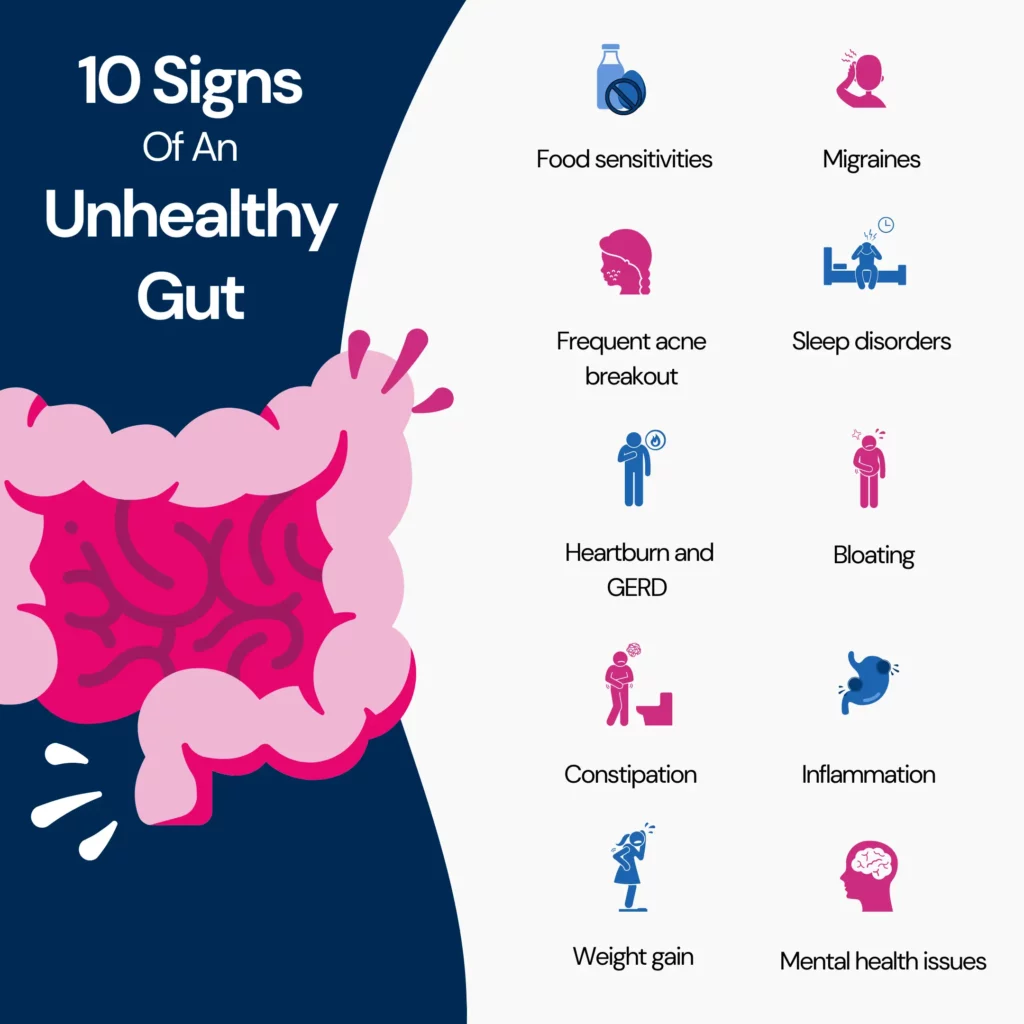
The following are some of the factors that affect gut health.
One of the major factors that affect gut bacteria is the food consumed.
A diet rich in vegetables and fruits may help develop a more diverse gut microbiome, while consuming excess processed food may damage intestinal linings and result in the presence of only a limited species of gut microbes.
A 2008 study suggests that a Western diet rich in saturated fats and sugar reduces the levels of Bacteroides (beneficial gut microbes) and increases the levels of firmicutes (bad gut microbes).
Several studies relate an increased ratio of firmicutes to Bacteroides to type II diabetes and obesity.
Some studies report that non-digestable dietary components called probiotics may help diversify gut microbiomes, improving gut health.
Aging is a factor that affects gut health. As people age, the gut microbe diversity decreases, marked by increased inflammation and digestive issues.
The gut microbiome makeup is also dependent on genetics.
Changes in certain genes can influence the presence or absence of certain gut microbes, thereby influencing gut health.
Long-term use of certain medications may affect gut health by altering the microbiome makeup.
For instance, antibiotics, used to treat bacterial infections, can destroy beneficial bacteria in the gut, leading to gut issues like inflammation and digestive problems.
Many studies report that the use of metformin to treat type II diabetes changes gut microbial patterns, affecting gut health in the long term.
A 2016 study reports that the gut microbiome pattern is different between infants born via vaginal delivery and those born by cesarean section.
According to the study, infants born by vaginal delivery are exposed to the mother’s bacteria at birth, which isn’t the case for infants born through a cesarean section.
The following are some of the health conditions that could be associated with an unhealthy gut.
A gut bacterial imbalance can show up as chronic digestive issues, skin breakouts, mental health issues, unexpected weight fluctuations, sudden food intolerances, or migraines.
There are specific tests that can help identify microbiome imbalance levels in the gut. This would help in making precise treatment plans.
Including different varieties of plant-based foods in your diet is a very easy way to improve the gut microbiome pattern and general gut health.
Whole foods are also great for maintaining a healthy gut.
Naturally, fermented foods contain different types of live microorganisms, which benefit the gut.
These foods are natural probiotics and must be included in plenty in one’s diet.
Some of the common types of fermented foods are yogurt, kefir, kombucha, kimchi, and pickled vegetables.
According to experts, processed foods that contain excess emulsifiers damage the lining of the intestinal walls, promote inflammation, and result in a leaky gut.
Reducing the consumption of processed food and choosing fresher and more natural ingredients is one way of protecting the gut.
Water is essential for optimal gut health - it helps break down food and prevent constipation and gut inflammation.
Probiotics are supplements or types of food that contain live microorganisms, while prebiotics are food that may help improve the gut microbiomes.
Most fiber-rich foods are prebiotics.
Including both prebiotics and probiotics would help diversify the microbiome pattern and improve gut health.
Stress affects every single organ in the body, including the gut.
Studies report that chronic exposure to stress may change brain-gut interactions and trigger gastrointestinal problems like IBD.
Moderate physical activity is one of the proven ways of diversifying gut microbiota and improving gut health.
According to a 2016 study, exercise could be an alternative therapy to deal with gut dysbiosis and related conditions.
There is no one magic supplement that would instantly improve gut health.
Instead, including the following supplements regularly in one’s diet may help improve gut health and diversify gut microbiota.
Processed foods, deep-fried foods, and artificial sweeteners in excess are three foods that can affect gut health.
Multiple studies report that caffeine in coffee diversifies gut microbiota and helps increase the number of beneficial bacteria growing in the gut.
Bad gut bacteria thrive on processed foods, excess sugar, alcohol, gluten, and dairy.
Eliminating or restricting these kinds of foods may be a way to starve bad bacteria.
Hand-picked content for you: Beating Bad Gut Bacteria: Starve Them!
There is no quick fix to improve gut health.
Choosing fiber-rich meals, staying away from processed and refined foods, staying physically active, and including probiotic supplements can all help improve gut health over time.
https://www.ncbi.nlm.nih.gov/pmc/articles/PMC4191858/#:
https://pubmed.ncbi.nlm.nih.gov/22797518/
https://www.ncbi.nlm.nih.gov/pmc/articles/PMC3427212/
https://www.nature.com/articles/s42255-021-00348-0#
https://www.ncbi.nlm.nih.gov/pmc/articles/PMC4528021/#
https://www.ncbi.nlm.nih.gov/pmc/articles/PMC5483960/
https://www.ncbi.nlm.nih.gov/pmc/articles/PMC4570153/
https://www.ncbi.nlm.nih.gov/pmc/articles/PMC4681099/
https://www.ncbi.nlm.nih.gov/pmc/articles/PMC5062956/
https://www.ncbi.nlm.nih.gov/pmc/articles/PMC6678709/
https://www.ncbi.nlm.nih.gov/pmc/articles/PMC6702393/#
https://www.ncbi.nlm.nih.gov/pmc/articles/PMC6379309/
https://www.ncbi.nlm.nih.gov/pmc/articles/PMC4976518/
https://www.ncbi.nlm.nih.gov/pmc/articles/PMC10096519
https://www.ncbi.nlm.nih.gov/pmc/articles/PMC7589951/
https://www.ncbi.nlm.nih.gov/pmc/articles/PMC4425030/
https://academic.oup.com/ckj/article/16/11/1804/7136173
https://www.ncbi.nlm.nih.gov/pmc/articles/PMC3337124/
https://www.nature.com/articles/s41579-023-00904-3#
Is breakfast really the most important meal of the day? Like many things about nutrition, the answer to this question is not straightforward. While some studies report that skipping breakfast could have detrimental effects on health, others don’t seem to think that it’s nearly as harmful. However, strong evidence suggests that a healthy breakfast can help boost your heart health. In this article, we'll explore key heart-friendly nutrients and share easy breakfast recipes to help you start your day with a healthier, happier heart.
To maintain optimum heart health, the following should be kept in check:
Diet plays a major role in balancing all these components.
Some key nutrients that help maintain heart health include:
Elevated triglyceride and bad cholesterol levels can increase the risk of atherosclerosis. Atherosclerosis is characterized by plaque formation and cholesterol deposition in the heart's arterial walls and can result in coronary heart disease and stroke.
Omega-3 fatty acids or polyunsaturated fatty acids (PUFAs), with a daily intake of 2 to 4 grams, reduce triglyceride levels by 25 to 40%.
EPA and DHA are two types of PUFAs that are very good for your health.
These fats also help prevent other conditions like autoimmune disorders, central nervous system issues, and chronic kidney disease.
Antioxidants help balance out ROS or Reactive Oxygen Species, which in excess can cause DNA damage and is a major risk factor for atherosclerosis.
Foods like blueberries, raspberries, and beets contain antioxidants called betalains, which may help reduce inflammation.
Studies have shown that intake of dark chocolate has a high antioxidant content and anti-inflammatory properties.
Dietary fiber, especially soluble fiber, has been shown to help lower total and low-density lipoprotein (LDL or bad) cholesterol levels.
Research indicates that foods like barley contain beta-glucan (a soluble fiber) that selectively reduces LDL and non-high-density lipoprotein (non-HDL) cholesterol levels.
Therefore, eating meals that include barley can help reduce heart disease risk.
Vitamin D regulates blood pressure by interacting with blood vessel cells.
Insufficiency or deficiency of vitamin D may cause blood vessels to become more rigid, leading to plaque buildup and increased blood pressure.
It also elevates blood vessel fat inflammation, increasing the risk for CVD.
Two essential minerals for heart health are potassium and magnesium.
Hand-picked Article For You: Can A Low-Carb Diet Help Your Heart Health?
Consuming whole grains rich in beta-glucan, including oatmeal, whole grain bread, and bran, lowers the risk of coronary heart disease.
Regular consumption of oats has also been shown to improve BMI, total cholesterol, and LDL cholesterol levels.
Green leafy vegetables rich in nitrate, like spinach, kale, and collard greens, reduce the risk of cardiovascular disease.
Eating one cup of these nitrate-rich vegetables daily can significantly lower heart disease risk.
They also reduce systolic blood pressure by about 2.5 mmHg and decrease heart disease risk by 12 to 26 percent, with the most significant reduction seen in peripheral artery disease, which narrows blood vessels in the legs.
Eggs are rich in dietary cholesterol but also provide high-quality protein, iron, healthy fats, and important nutrients.
Despite concerns about cholesterol in the egg yolk, studies show that eating one egg per day does not increase cardiovascular disease risk and may even reduce it in some populations.
Other heart-healthy foods include:
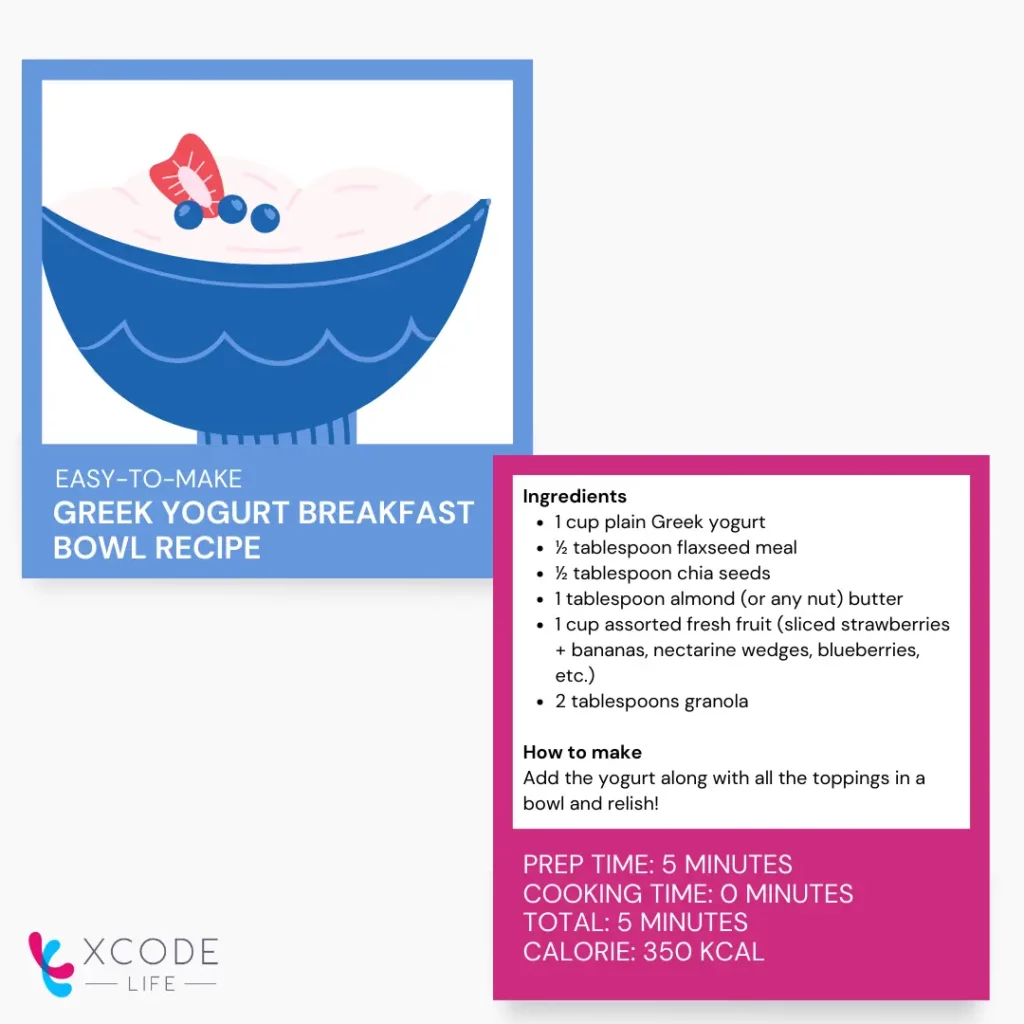


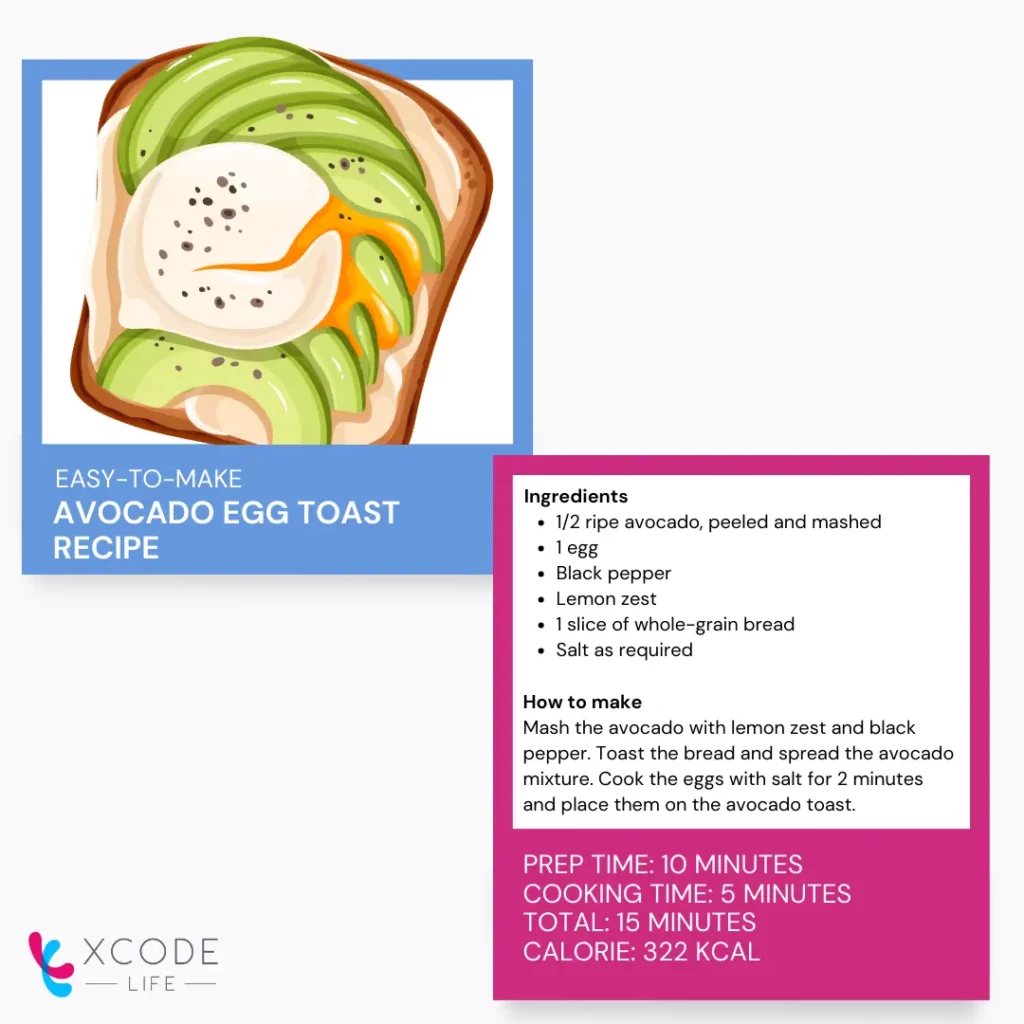
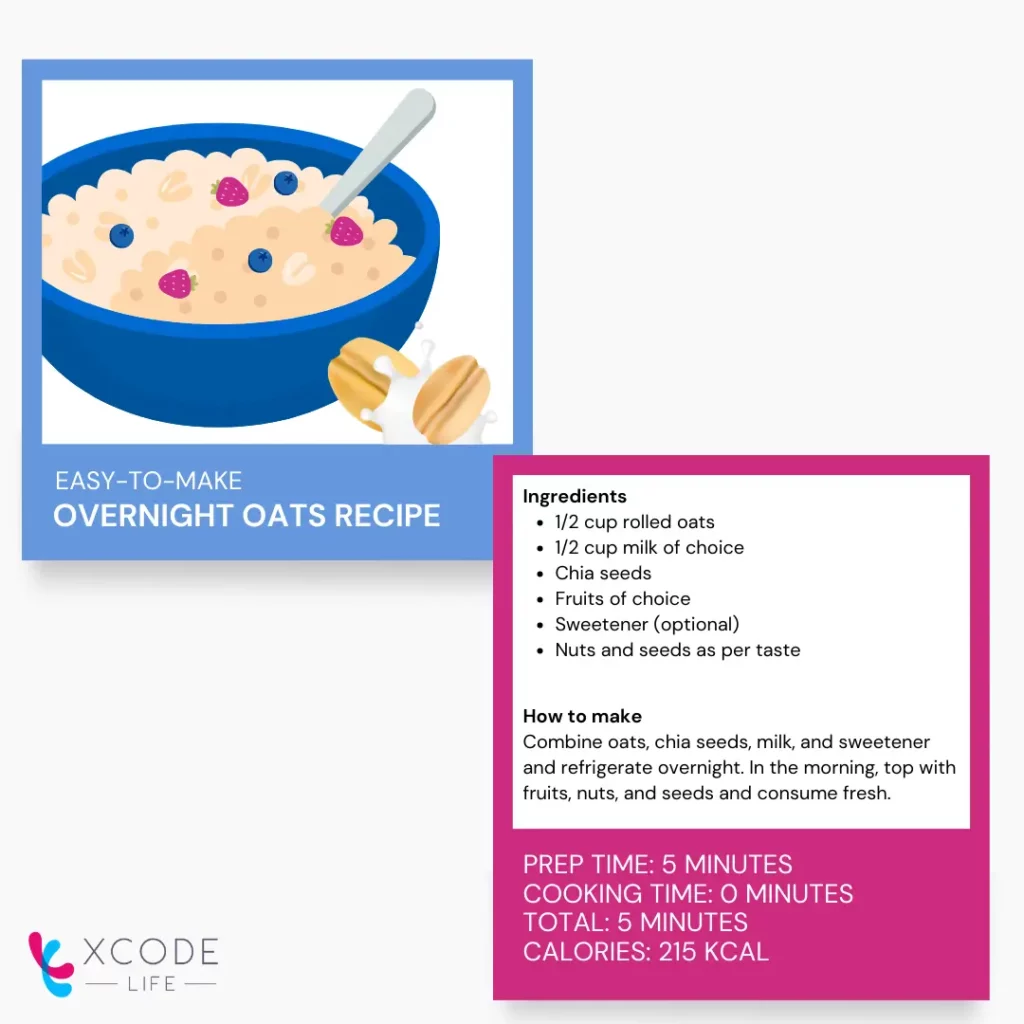
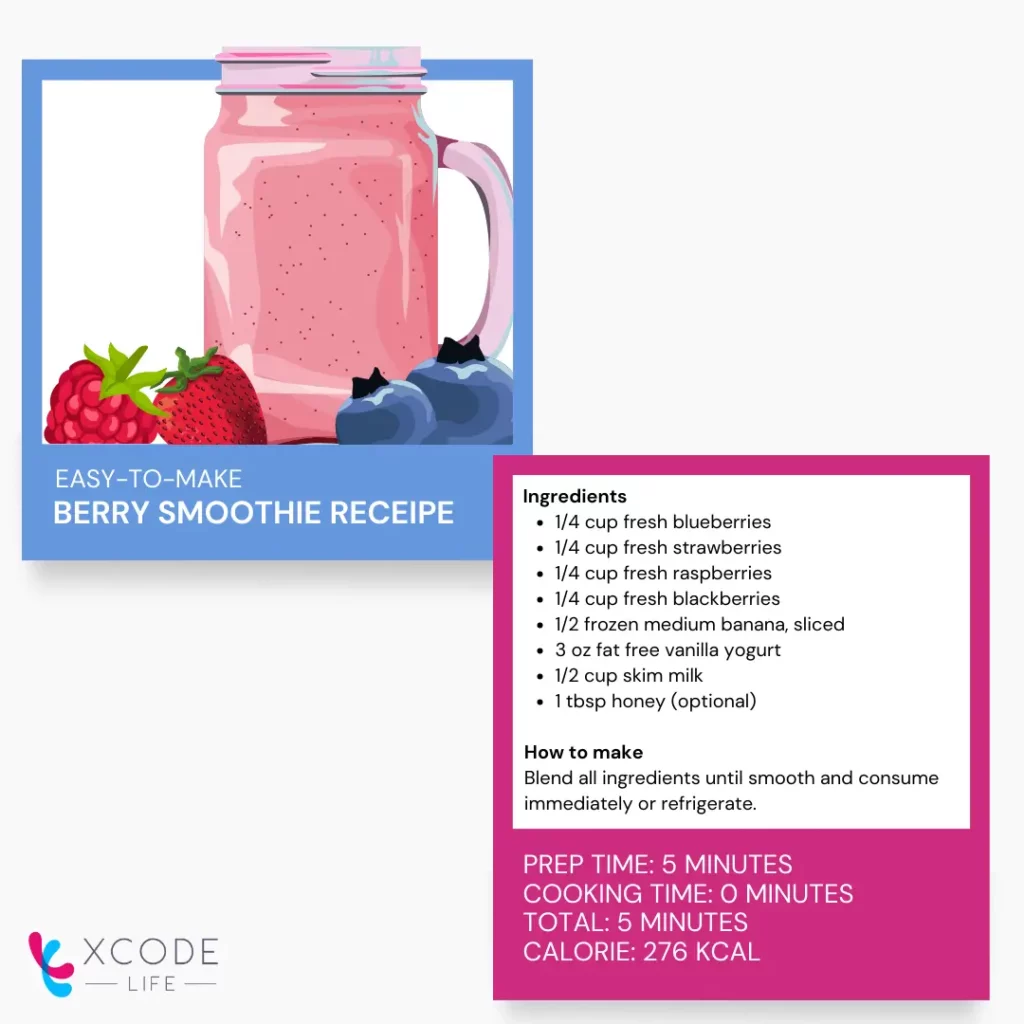
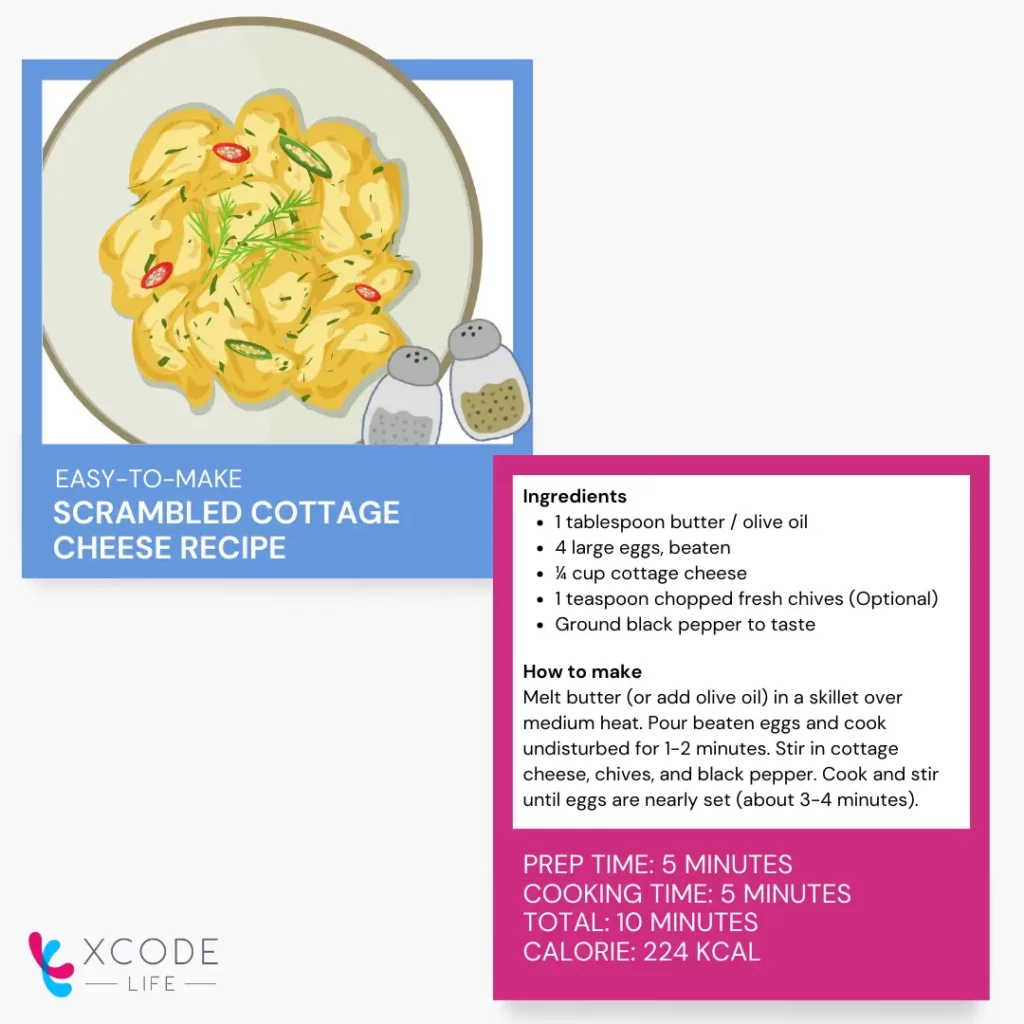
Three major diets have strong evidence of cardiovascular benefits.
The American Heart Association suggests avoiding these foods for optimal heart health:
Breakfast can play a crucial role in heart health. While studies are mixed on the importance of breakfast, a healthy morning meal has been shown to benefit heart health.
Key nutrients for maintaining a healthy heart include omega-3 fatty acids, antioxidants, fiber, vitamins, and minerals. These nutrients help regulate blood pressure, cholesterol, and inflammation.
Heart-healthy breakfast foods include whole grains, leafy green vegetables, eggs, seafood, nuts, seeds, dairy products, and healthy fats like olive oil.
Quick and easy breakfast dishes like smoothies, overnight oats, toast, etc., can help incorporate these ingredients into your diet to start your day right.
Three diets with proven cardiovascular benefits are the Mediterranean diet, the DASH diet, and plant-based diets. These diets emphasize whole, unprocessed foods and limit processed foods, red meat, and unhealthy fats.
For optimal heart health, avoid high-fat dairy products, fatty and processed meats, tropical oils, processed foods, and items high in added sugars and sodium.
Around 40% of Americans harbor a mutation in the MTHFR gene that puts them at high risk for vitamin B9 deficiency. This can result in the build-up of a harmful substance which is associated with health conditions like heart disease, stroke, and certain types of cancer. But the good news here is the effects of MTHFR mutation can simply be tackled with nutritional supplements. This article discussed in-depth L-methylfolate, a form of vitamin B9 with significant benefits to the body.
Xcode Life's MTHFR and Methylation Genetic Testing Overview
Order your MTHFR report today at a discounted price $50 $30
MTHFR (methylenetetrahydrofolate reductase) is a vital enzyme that maintains a healthy balance of homocysteine in the blood by converting excess of it to a safer amino acid called methionine.
L-Methylfolate is a nutritional supplement containing the biologically active form of vitamin folate, 5-methyltetrahydrofolate.
Folate is the naturally occurring variant of vitamin B9 and is essential for the body to create red blood cells.
Folate deficiency can lead to decreased red blood cells in the blood, as well as anemia.
It can also lead to an excess amino acid in the blood and hyperhomocysteinemia.
L-Mehtylfolate is used to treat folate deficiency in the body.
Methylfolate is the more active form of folate, which plays a role in several bodily functions.
Methylfolate supplements can help boost RBC production.
According to a study, compared to those who received just folic acid, those on methylfolate had significantly higher red blood cell folate over time.
Some studies suggest that L-methylfolate can boost the effect of antidepressants in people with all levels of depression.
This is based on the hypothesis that folate deficiency can result in resistance to depression treatment.
Further, L-methylfolate can cross the blood-brain barrier to help facilitate the production of hormones like serotonin and dopamine.
Homocysteine is an amino acid that is harmful to the body at higher levels. It is a risk factor for several conditions, especially cardiovascular disease.
The MTHFR cycle helps keep homocysteine levels at bay.
A key compound for this is methylfolate which converts homocysteine to methionine by adding a methyl group to it.
Apart from this, L-methylfolate also:
| Folic Acid | L-methylfolate | |
| Source | Food sources, supplements (inactive form of folate) | Only in supplements (active form of folate) |
| Absorption | Needs to be converted into active form before the body can absorb and use | Already in active form ready for the body to absorb and use |
| Site of absorption | Liver | Intestine |
| Blood-brain barrier | Cannot pass | Can pass; hence useful to treat mental health conditions |
| MTHFR mutation | If mutation is present, folic acid may not be converted into folate; risk of folate deficiency | Already in active form; effective for those with MTHFR gene mutations |
Folate is a form of vitamin B necessary for normal functioning.
Folate plays a vital role in producing red blood cells in the body.
It is also an essential nutrient for pregnant women since folate helps in fetal development and prevents congenital disabilities.
Folate deficiency can cause reduced production of normal RBCs and anemia.
Folate deficiency in pregnant women can cause congenital disabilities, low birth weight, and even autism in babies.
Folate deficiency symptoms are often subtle and can be confused with the symptoms of other conditions.
*not everyone with vitamin B9 deficiency may experience these symptoms, and not everyone who has them necessarily are vitamin B9 deficient.
Some common causes of folate deficiency are:
Did You Know? You can identify your MTHFR status using your 23andMe or any ancestry test DNA raw data
The MTHFR gene regulates how the body methylates certain nutrients, including folate.
It converts another form of folate called 5,10-methylenetetrahydrofolate (5,10-MTHF) to 5-methyltetrahydrofolate (5-MTHF) or L-methylfolate.
Some people have variants or changes in the MTHFR gene that can interfere with how it functions.
This may lead to poor conversion of 5,10-MTHF to 5-MTHF, resulting in methylfolate deficiency.
Hence, those with MTHFR gene variants may benefit from L-methylfolate supplements.
You should avoid taking L-methylfolate if you are allergic to it.
Also, inform your doctors about the following conditions if you are about to start taking L-methylfolate.
Methylfolate is safe for most and does not cause any side effects. However, some people may experience the following:
Another risk factor of taking an L-Methylfolate supplement is it can mask the symptoms of vitamin B12 deficiency.
Over time, not getting treated for vitamin B12 deficiency can lead to nerve damage.
Mehtylfolate supplements can react with some medications, such as:
Always talk to your doctor before starting any supplements.
L-Mehtylfolate usually does not lead to weight gain.
Your diet and lifestyle, however, will influence your body's interaction with the supplement.
You can take methylfolate supplements daily.
The RDA for folate is 400 μg/day for adults and 600 μg/day for females around the pregnancy phase.
It may take several weeks to notice any actual benefits of L-methylfolate supplements.
Taking folate supplements can often hide a vitamin B12 deficiency, which can cause other health issues later.
This is why you can take vitamin B12 supplements along with folate supplements.
However, always consult your doctor to rule out any possibility of drug interactions.
You can take methylfolate supplements anytime during the day, in the morning, or at night.
Some experts believe you should take it in the morning or at lunchtime.
However, that does not affect the efficacy of the supplements.
You can also take it with or without food.
When choosing the best Methylfolate supplement, we recommend selecting a product free from preservatives and other unwanted ingredients.
We recommend MethylPro methylfolate supplement.
Made with high-quality methylfolate, it is free from additives, preservatives, and binders.
The company offers L-Methylfolate supplements with various strengths to support your physical and mental health.
Folate is a nutrient that plays a significant role in the body.
It helps form red blood cells and is vital for fetal development.
Folate deficiency can cause anemia, depression, and infertility.
L-Methylfolate supplements are prescribed to those who suffer from folate deficiency.
It is a safe supplement and usually does not cause any severe side effects.
However, always make sure that you consult your doctor before starting any supplement.
https://www.ncbi.nlm.nih.gov/pmc/articles/PMC9380836
https://www.ncbi.nlm.nih.gov/pmc/articles/PMC7572139
https://www.ncbi.nlm.nih.gov/pmc/articles/PMC6282622
In recent times, an emerging area of interest is the use of dietary supplements for treating signs of Attention-deficit/hyperactivity disorder (ADHD). One such supplement is L-theanine, an amino acid in food sources like tea and mushrooms. Some research studies claim that L-theanine may help manage ADHD by improving focus and attention and decreasing impulsivity. While there is a need for more conclusive and larger-scale studies, this is an exciting area of research worth exploring.
Attention-deficit/hyperactivity disorder (ADHD) is a neurodevelopmental disorder that leads to difficulties in staying attentive and focused, resisting temptations, and following instructions.
ADHD is often diagnosed in childhood, before the age of 12.
ADHD can lead to issues with social interactions, academic performance, and general behavioral challenges.
There are three major types of ADHD.
L-theanine is an amino acid found in some plant and fungal sources.
Green tea contains about 50% of this amino acid and is its largest dietary source.
A 200 ml cup of black tea has up to 25 mg of L-theanine, and Xerocomus badius, a type of mushroom, is also L-theanine-rich.
L-theanine has various health benefits, such as the following.
One of the significant benefits of L-theanine seems to be its ability to improve focus and attention span, which could help alleviate ADHD symptoms.
L-theanine affects the brain in two significant ways.
Glutamate is a brain chemical that enhances memory and learning.
L-theanine acts as a glutamate reuptake inhibitor in the brain.
Studies often link low glutamate levels with the risk of Alzheimer’s or Parkinson’s Disease.
A glutamate reuptake inhibitor prevents the reabsorption of glutamate, ensuring enough is available for circulation.
The Gamma-Aminobutyric Acid (GABA) receptors act opposite to glutamate by controlling the nerve cells from sending or receiving signals.
By slowing down certain functions in the brain, these GABA (A) receptors can reduce stress and anxiety, calm the brain, and improve sleep.
L-theanine affects the functioning of the GABA (A) receptors, offering a protective effect on neurons.
Over the last couple of decades, researchers have explored the idea of using L-theanine to target the signs of ADHD.
fMRI scans of people with ADHD have shown changes in the regions of the brain that control distraction, attention, and cognition.
L-theanine emerges as a promising supplement for ADHD management, enhancing memory, attention, and alertness through its impact on neurotransmitters and brain wave activity.
Research highlights its potential when combined with caffeine, showing improved cognitive performance and mood, with effects noticeable within an hour of ingestion.
L-theanine may also improve the circulation of glutamate and GABA in the brain, thereby improving memory and attention span.
This amino acid may further help control alpha brain waves, which can keep the person in a state of alertness.
L-theanine can also regulate sleep, which can further help in ADHD management.
While the existing studies provide a positive outlook, further research is necessary to fully validate its effectiveness.
Individuals considering L-theanine for ADHD should consult with healthcare providers to tailor the supplement to their specific needs, ensuring an effective and personalized approach to managing ADHD symptoms.
Yes. Research claims that L-theanine acts as a brain relaxant by helping increase dopamine levels.
Over the past few years, several studies have explored the use of L-theanine for ADHD symptoms in the past.
| Overview | Study Design | Results |
| A 2019 study involving five male children (8–17) years with ADHD | One group was administered with L-theanine (2.5 mg/kg body weight) + caffeine (2.0 mg/kg body weight), and the other, a placebo for 4 separate days. | L-theanine + caffeine improved sustained attention and overall cognitive performance in children with ADHD by reducing mind wandering. |
| A 2008 study involving 9 male and 15 female participants; mean age 21.3 years | The participants were randomly given either a placebo, caffeine, L-theanine, or a combination of both. Everyone took cognitive tests and rated their mood before taking anything, then again 30 and 90 minutes later. | L-theanine alone was associated with more headaches and a decrease in performance on a mental math task. Caffeine improved reaction times and accuracy on certain cognitive tasks and decreased self-reported mental fatigue. The combination of L-theanine and caffeine led to improvements in simple reaction time, working memory, sentence verification accuracy, mood, and reduced feelings of tiredness and headache. |
| A 2011 study evaluating the effect of L-theanine on attention and reaction time response in 18 normal healthy University student volunteers | The participants drank either L-theanine, caffeine, or placebo. The researchers wanted to see how these drinks affected the participants' minds and moods. They checked this by having the participants do attention tests and rating their moods at different times after drinking. They also measured how fast their hearts were beating. | In participants with a high predisposition to anxiety, there was a notable improvement in their attention and reaction time after taking L-theanine, compared to the placebo. Specifically, these individuals showed a marked increase in correct responses and faster reaction times shortly after ingesting L-theanine. L-theanine had little effect on its own, but when combined with caffeine, it led to significant improvements in reaction times, memory tasks, and mood. |
| A 2014 study evaluating the effect of L-theanine in 98 children with ADHD, ages 8-12 years | Participants consumed two chewable tablets twice daily (at breakfast and after school), with each tablet containing 100 mg of L-theanine or identical-tasting chewable placebo for six weeks. | Boys who consumed L-theanine had significantly higher sleep percentage and sleep efficiency scores and a non-significant trend for less activity during sleep compared to those in the placebo group. |
Bottomline
L-theanine has emerged as a potential aid in ADHD management, demonstrating benefits in enhancing cognitive functions, attention, and sleep quality. Research highlights its potential when combined with caffeine, showing improved cognitive performance and mood, with effects noticeable within an hour of ingestion. Optimal dosages of up to 400 mg daily have been well-tolerated in children, suggesting a safe and beneficial role in ADHD therapy. While the existing studies provide a positive outlook, further research is necessary to fully validate its effectiveness. Individuals considering L-theanine for ADHD should consult with healthcare providers to tailor the supplement to their specific needs, ensuring an effective and personalized approach to managing ADHD symptoms.
According to research, up to 400 mg of L-theanine daily was well-tolerated in children aged 8 to 12.
Discussing with one’s healthcare provider before starting any supplement is essential.
Most studies suggest combining L-theanine and caffeine is more effective than using just either.
The calming effects of L-theanine could kick in as early as 40-60 minutes post ingestion.
Studies suggest taking the supplement for at least four weeks to experience its effects on stress, cognition, focus, and memory span.
The best time to take L-theanine depends on what it is prescribed for. It takes about 30-40 minutes to take effect. If it is for sleep, it is best to take it around an hour before bedtime.
Generally, however, L-theanine is regarded as safe to be taken at any time of the day.
Your medical practitioner should be able to offer the best advice on this.
All children who were a part of L-theanine and ADHD studies were eight years or older. The effect of the supplement on younger children is unknown.
It isn’t clear if L-theanine is safe for pregnant and breastfeeding women.
There is no cure for ADHD currently, but management options are available. The following are some of the management options for the condition.
https://pubmed.ncbi.nlm.nih.gov/37175254/
https://pubmed.ncbi.nlm.nih.gov/25759004/
https://www.sciencedirect.com/science/article/abs/pii/S1874390008000335
https://www.ncbi.nlm.nih.gov/pmc/articles/PMC7647716/
https://pubmed.ncbi.nlm.nih.gov/18296328/#
https://pubmed.ncbi.nlm.nih.gov/28722868/
https://www.ncbi.nlm.nih.gov/pmc/articles/PMC6574559/
https://www.ncbi.nlm.nih.gov/pmc/articles/PMC8794723/
https://www.sciencedirect.com/science/article/pii/S1756464611000351#:
https://pubmed.ncbi.nlm.nih.gov/12596867/
https://pubmed.ncbi.nlm.nih.gov/17928735/
https://www.ncbi.nlm.nih.gov/pmc/articles/PMC6574559/
https://www.sciencedirect.com/science/article/pii/S1756464611000351#
https://pubmed.ncbi.nlm.nih.gov/22214254/
https://www.forbes.com/health/mind/best-supplements-for-adhd/
https://www.medicalnewstoday.com/articles/l-theanine-adhd
https://www.ncbi.nlm.nih.gov/pmc/articles/PMC6574559/
https://www.verywellmind.com/l-theanine-for-adhd-5248441
https://www.ncbi.nlm.nih.gov/pmc/articles/PMC8794723/
https://www.nature.com/articles/s41598-020-70037-7
https://www.donefirst.com/blog/can-l-theanine-help-manage-adhd-symptoms
https://www.sciencedirect.com/science/article/pii/S1756464611000351
https://www.healthline.com/health/l-theanine
Deep within every cell of your body lies a hidden language written in a microscopic script. This complex code, meticulously crafted to control everything from your eye color to your vulnerability to disease, is the essence of life itself – DNA. But, the secrets of DNA extend beyond its role as a blueprint. How are its building blocks arranged? How do they interact to form the complex structure that stores and transmits genetic information? What happens when these building blocks come together to create proteins? Let's explore these questions and learn more about how amazing DNA is.
DNA (deoxyribonucleic acid), often described as the blueprint of life, is a fundamental molecule found in every cell of living organisms.
It contains the instructions needed for an organism to develop, survive, and reproduce.
Stored within the cell nucleus, DNA is organized into structures known as chromosomes.
These chromosomes are like instruction manuals, each containing a specific segment of DNA crucial for various functions and characteristics of the organism.
DNA carries the instructions for building proteins.
These proteins are responsible for everything from building tissues and organs to carrying out essential functions like metabolism and respiration.
Each DNA sequence that serves as a set of instructions to produce a protein is recognized as a gene.
Genes only make up 1 percent of the entire DNA sequence; the remaining 99 percent of DNA sequences are involved in the complex regulation of when, how, and in what quantity proteins are produced.
This control system ensures that the body functions precisely and efficiently.
The building blocks of DNA are called nucleotides or bases. These sit next to each other, forming strands of DNA. You can envision this as beads strung together to form a chain.
In the case of DNA, there are about 3 billion beads.
There are four types of nucleotides, each with a unique structure:
A and G belong to a class called purines, and G and C belong to pyrimidines.
The arrangement of these bases along the DNA strand forms the genetic code, the language of life.
This code is written in three-letter words called codons, each specifying a particular amino acid.
Amino acids are essential elements that serve as the fundamental building blocks of proteins. Their precise arrangement determines the protein's shape and function.
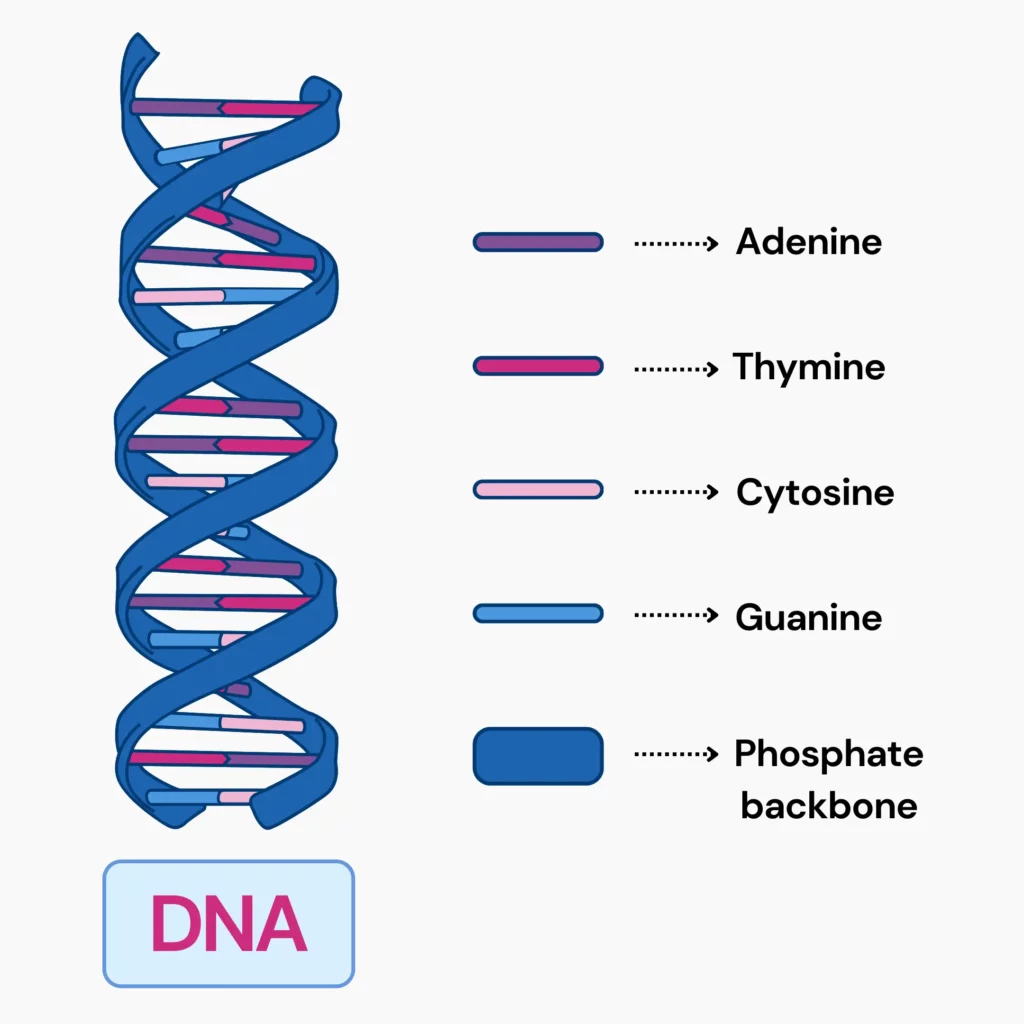
There are 3 main types of building blocks in DNA:
1. Phosphate group:
2. Sugar molecule (deoxyribose):
3. Nitrogenous base:
The sequence of nitrogenous bases in DNA decides the genetic code, which encodes the instructions for building molecules like proteins.
The number of building blocks in DNA differs among organisms and chromosomes.
In humans, there are about 3 billion building blocks per cell, spread across 23 pairs of chromosomes, each having a different amount, ranging from 50 million to 250 million.
For instance, a bacterium called Carsonella ruddii has the smallest genome, containing only 160 thousand building blocks.
The double helix characterizes DNA's structural makeup. DNA consists of two linked strands forming a helix, resembling a twisted ladder.
Every strand has a backbone of alternating sugar (deoxyribose) and phosphate groups, with bases (A, T, C, G) attached to the sugars.
Chemical bonds between complementary bases (adenine with thymine, cytosine with guanine) connect the two strands, giving rise to the distinctive double-helix shape.
This structure encodes information for building and operating living systems.
Proteins consist of amino acids connected together by peptide bonds to create a polypeptide chain.
With 20 different amino acids, each with unique properties, DNA provides instructions for assembling them in a specific order.
Gene expression, the process of making proteins from DNA instructions, involves two steps:
Peptide bonds then join the amino acids, forming a polypeptide chain that folds into a specific shape, creating a protein.
DNA was discovered through the work of many scientists over time.
In the 1860s, Johann Friedrich Miescher, a Swiss chemist, first found a substance in white blood cells, later known as DNA.
Albrecht Kossel, a German biochemist, identified this substance as deoxyribonucleic acid in 1881 and discovered its five main components.
The theory that chromosomes carry genetic information from parents to children was proposed in the early 1900s by Walter Sutton and Theodor Boveri.
Finally, in the 1950s, James Watson and Francis Crick famously determined DNA's double-helix structure.
Each of these scientists contributed to our understanding of DNA as the blueprint of life.
DNA holds the instructions for building and operating living organisms, serving as the blueprint of life.
It's made up of smaller units called nucleotides, each consisting of a sugar molecule, a phosphate group, and a nitrogenous base.
Four nitrogenous bases exist: A, T, G, and C. These bases pair up in specific ways (A with T, G with C) to form the famous double helix structure.
DNA's code is written in three-letter words called codons, each specifying a particular amino acid – the building blocks of proteins.
The number of building blocks in DNA varies among organisms, with humans having around 3 billion per cell.
DNA plays a crucial role in development, survival, reproduction, and passing traits to offspring.
https://www.genome.gov/about-genomics/fact-sheets/Deoxyribonucleic-Acid-Fact-Sheet
https://medlineplus.gov/genetics/understanding/basics/chromosome/
https://www.genome.gov/genetics-glossary/Nucleotide
https://www.yourgenome.org/stories/the-discovery-of-dna/
https://www.ashg.org/discover-genetics/building-blocks/
https://www.nature.com/scitable/definition/codon-155/
https://www.sciencedirect.com/topics/biochemistry-genetics-and-molecular-biology/nitrogenous-base
https://www.genome.gov/genetics-glossary/Genome
https://www.ncbi.nlm.nih.gov/books/NBK218247/
https://pubmed.ncbi.nlm.nih.gov/17038615/
https://www.genome.gov/genetics-glossary/Double-Helix
https://medlineplus.gov/genetics/understanding/howgeneswork/makingprotein/
https://www.ncbi.nlm.nih.gov/books/NBK26829/
Mutations within the MTHFR gene can unexpectedly impact children's health, leading to various unforeseen challenges. This gene is crucial for properly breaking down homocysteine, an amino acid that needs to be kept at safe levels in the bloodstream. This delicate balance can be disrupted when MTHFR gene mutations occur, potentially resulting in various health issues. Parents must know how these genetic variations might influence their child's well-being. Could specific physical abnormalities, developmental delays, or behavioral concerns be linked to an MTHFR mutation? What symptoms should you watch for, and how can you best support a child affected by this genetic change? This article explores the essential aspects of MTHFR mutations, from the genetic details to the possible health implications. Stay with us as we uncover the signs, symptoms, and steps you can take to manage this condition effectively.
Xcode Life's MTHFR and Methylation Genetic Testing Overview
Order your MTHFR report today at a discounted price $50 $30
MTHFR (methylenetetrahydrofolate reductase) is a vital enzyme that maintains a healthy balance of homocysteine in the blood by converting excess of it to a safer amino acid called methionine.
Mutations in the MTHFR gene can make this enzyme less effective, potentially causing health problems.
Genetics of MTHFR mutations:
We all inherit two copies of the MTHFR gene, one from each biological parent. So, you can have the following possible combinations:
Common MTHFR variants:
Two common types of MTHFR mutations exist:
Mutations in the MTHFR gene can affect children in various ways. Common symptoms include:
Note: Having an MTHFR mutation does not guarantee that a child will experience all or any of these symptoms. These symptoms can also be indicative of other conditions. Always consult with a healthcare professional for an accurate diagnosis and appropriate management.
Alterations in the MTHFR gene can lead to health problems. Some symptoms include:
Crucial reminder: Having an MTHFR gene change doesn't mean you'll get these conditions. Other factors like lifestyle, environment, and medical history matter, too.
A homocysteine blood test can help identify the presence of MTHFR mutations.
Elevated levels could indicate a mutated MTHFR gene.
However, please note that even with MTHFR gene mutations, homocysteine levels may still be normal. In this case, no medical intervention may be required.
The symptoms mentioned above can also indicate a possible MTHFR mutation.
A genetic test focusing on the MTHFR and other methylation genes can also help identify variants or mutations that could impact the enzyme functioning.
MTHFR testing can be done through a simple DNA cheek swab, saliva test, or blood sample.
Some companies also allow users to upload their existing DNA raw data file to provide the MTHFR and Methylation status.
Hand-picked Article For You: Genetic Methylation Test In 2024: The Where, How, & Why
*reports are generated only using existing DNA raw data. xcode does not ship out any DNA kits
Research on the relationship between the MTHFR gene mutation and various health conditions in children reveals several common observations:
These findings show the importance of considering MTHFR mutations in children with these conditions.
Early detection and appropriate management strategies, including folate supplementation, may help mitigate associated risks and improve outcomes.
Limited research suggests a potential connection between MTHFR deficiency and ADHD.
A recent study highlights the case of two biological siblings diagnosed with ADHD and autism. They exhibited improvement in symptoms after starting folate supplementation alongside traditional psychopharmacological treatment.
MTHFR is an essential enzyme associated with various psychiatric mental health illnesses.
Testing for MTHFR deficiency, detectable through bloodwork or a cheek swab, is not routinely performed due to limited provider awareness and cost concerns. This oversight may result in undiagnosed and untreated deficiencies.
Supplementation with folate, an over-the-counter treatment option for individuals lacking in MTHFR, has shown potential benefits.
However, there is limited evidence regarding the effectiveness of folate supplementation in conjunction with psychotropic medications for ADHD.
MTHFR gene variations during pregnancy can affect folate processing, an essential nutrient for fetal development.
While not a guarantee, these variations might increase the risk of birth defects like neural tube defects and preeclampsia.
However, folic acid supplements significantly reduce these risks. Even with MTHFR variations, folic acid (400 mcg daily, CDC recommendation) ensures enough usable folate for healthy development.
Testing for MTHFR mutations isn't routinely recommended (ACMG) because focusing on adequate folic acid intake is most effective. Discuss any MTHFR concerns with your doctor and start folic acid, ideally before conception.
Scientific evidence suggests that MTHFR deficiency follows an autosomal recessive inheritance pattern. You typically need two copies of the variant gene, one inherited from each parent.
The study focused on a family with a child with severe MTHFR deficiency symptoms. Genetic testing identified a new mutation in the MTHFR gene.
Importantly, this mutation was present in both copies (homozygous) in the child, meaning they inherited it from both parents.
This finding supports autosomal recessive inheritance, where two variant copies are needed for the condition.
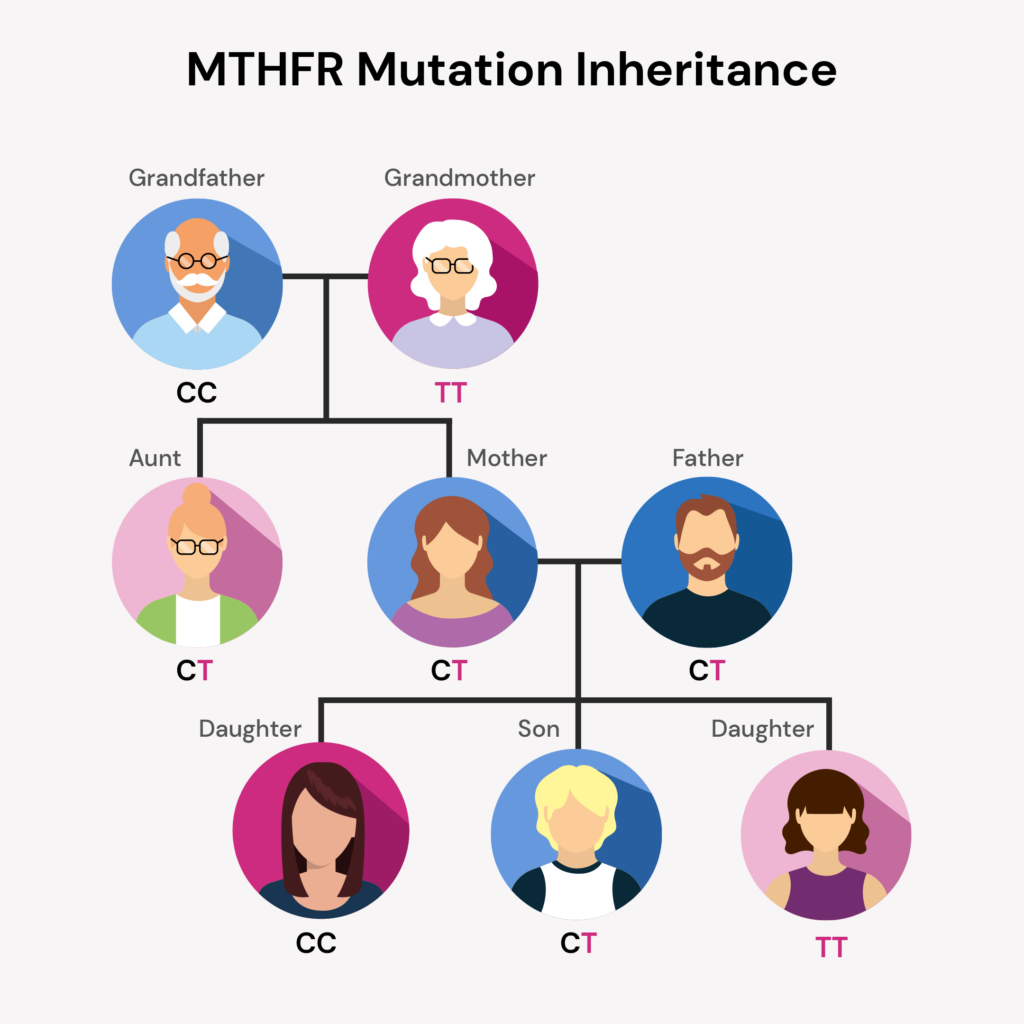
MTHFR mutations (or changes) can travel through families because we inherit one MTHFR gene from each parent.
Everyone has two copies, and changes can occur in either or both genes.
If a close relative or parent has an MTHFR change, the chances of inheriting the same variant increase.
This risk becomes even higher when both parents carry a change, raising the possibility of a child inheriting a homozygous MTHFR change (mutations in both copies).
This autosomal recessive inheritance pattern explains why MTHFR mutations can be more prevalent within families.
Many children with MTHFR gene variations can benefit from targeted dietary adjustments and support for a healthy gut. Here's how:
Targeted nutrients:
You May Be Interested In: What Is The Best Multivitamin For MTHFR Mutation?
Supporting gut health:
Dietary folate recommendations:
Here's a guide for recommended daily folate intake based on age:
Focusing on these dietary adjustments and supporting a healthy gut can effectively manage many symptoms associated with MTHFR polymorphisms in children.
Due to unique vitamin processing, children with MTHFR changes might require specific nutritional support.
"Highly absorbable" forms like methylated folate and B12 are often recommended to optimize absorption.
B6, choline, betaine, and magnesium may further support methylation processes.
Consulting a healthcare professional is essential for creating personalized supplement plans, determining dosages, and addressing any medication interactions.
Doctors diagnose MTHFR variations through a combination of methods. These include reviewing your medical history, assessing your current experiences (symptoms), and performing a physical examination.
A blood test might also be recommended to check homocysteine levels, as abnormalities can point toward MTHFR issues.
However, genetic testing is the most definitive way to confirm an MTHFR mutation.
MTHFR mutations can significantly impact a child's health by disrupting homocysteine breakdown. This can lead to various issues, such as physical abnormalities, developmental delays, and behavioral concerns.
Early detection is key. Recognizing symptoms like respiratory problems, immune issues, mental health struggles, and learning difficulties can significantly improve management and outcomes.
Diagnosis involves reviewing family history, analyzing symptoms, and potentially using genetic testing and blood tests.
Management involves dietary adjustments, targeted supplements (L-methylfolate, B vitamins), and gut health support (probiotics, nutrients).
Consulting doctors ensures personalized plans and avoids medication interactions.
By understanding and proactively managing MTHFR mutations, parents can help their children grow.
https://www.medicalnewstoday.com/articles/326181
https://www.ncbi.nlm.nih.gov/pmc/articles/PMC10106103
https://www.ncbi.nlm.nih.gov/pmc/articles/PMC5766142
https://www.ncbi.nlm.nih.gov/pmc/articles/PMC4344969
https://sci-hub.st/10.1177/0883073809333527
https://pubmed.ncbi.nlm.nih.gov/34511169
https://www.gimjournal.org/article/S1098-3600(21)00916-3
https://www.ncbi.nlm.nih.gov/pmc/articles/PMC10218448
https://www.sciencedirect.com/science/article/abs/pii/S2773044122000705
https://www.ncbi.nlm.nih.gov/pmc/articles/PMC4772032
https://www.ncbi.nlm.nih.gov/pmc/articles/PMC4698498
https://www.ncbi.nlm.nih.gov/books/NBK56068/table/summarytables.t2